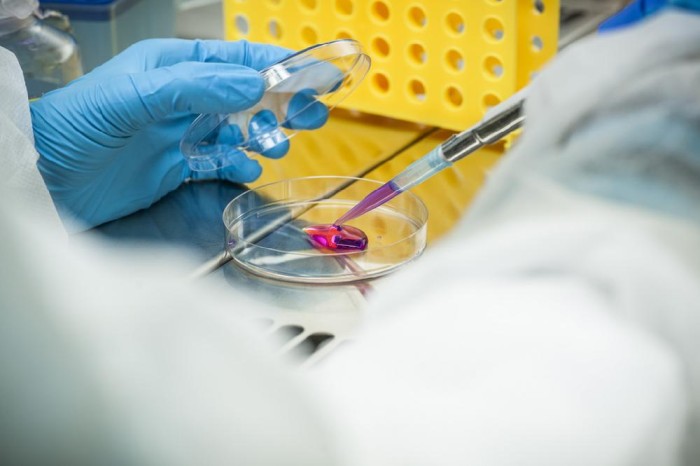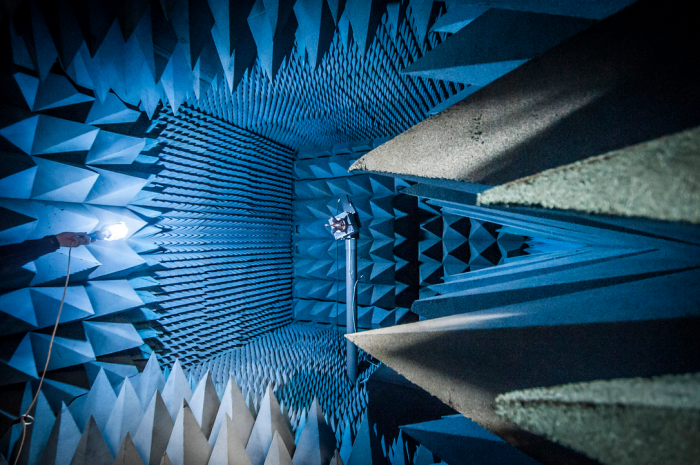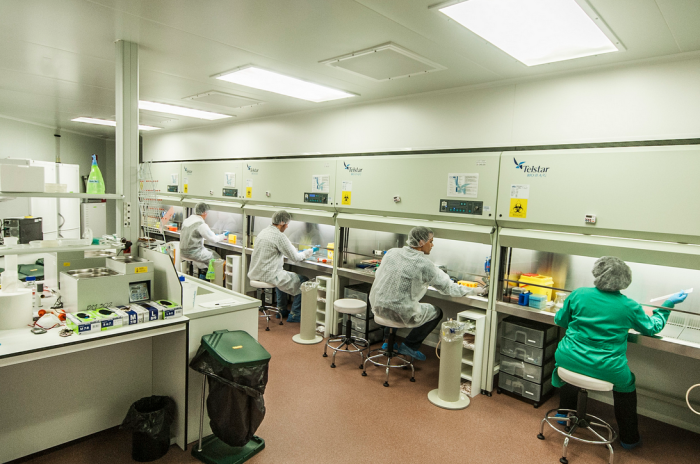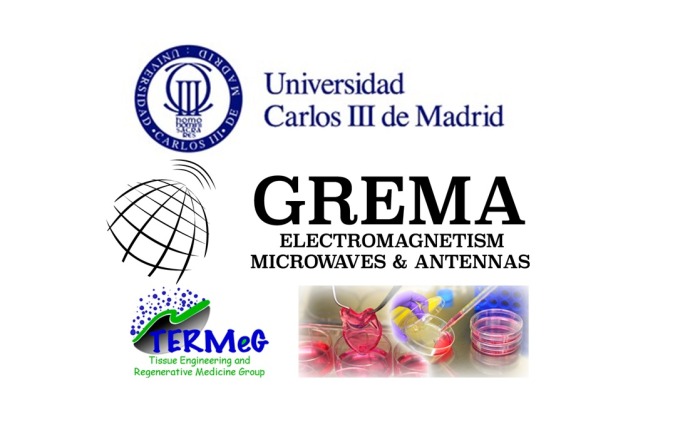Contributing € 10
You will be included in our web as co-financier with your photograph
Our gratitude for your contribution will be published and you will be included in our web as co-financier with a photograph of your own choice.
> 18 Co-financiers
Goteo ha construido una historia única en el mundo del micromecenazgo. ¿Quieres seguir formando parte de ella?
 Min.
Min.
 Opt.
Opt.
 Leganés (Madrid)
Leganés (Madrid)
Our gratitude for your contribution will be published and you will be included in our web as co-financier with a photograph of your own choice.
You wil receive a microscope image from our laboratories and our gratitude for your contribution will be published. You will be included in our web as co-financier with a photograph of your own choice.
You will get the button with our logo, and all previous rewards, including public acknowledgment in our web with your photograph.
You will get a copy of our sensor and all previous rewards.
You can visit our laboratories and know our project in detail.
You can attend a technichal seminar to know in depth the progress of the project and its results. You will also get all previous rewards.
Recognized support as sponsor in our web, publications and all platforms and dissemination events in wich the results will be presented.
High-visibility support acknowledgment as sponsor in our web, publications and all platforms and dissemination events in wich the results will be presented.
Contribute to develop innovative biosensors for disease diagnosis improvement
 Task
Task
|
Minimum | Optimum |
|---|---|---|
|
Publication costs
Publicación en abierto de los resultados obtenidos
|
€ 2.000 | |
|
Device design
Design and optimization of metamaterial based biosensors
|
€ 500 | |
|
Fabrication
Prototype fabrication
|
€ 1.000 | |
|
Functionalization
Design and application of a functionalization protocol for specific detection of the biomolecules under study
|
€ 1.000 | |
|
Experimental validation
Electronic and biological experimental validation of the implemented prototypes
|
€ 500 | |
|
Minimum management costs
Management expenses of Goteo and payment platforms
|
€ 1.050 | |
|
Prototype improvement
Study for prototype improvement, use of new materials and further functionalities
|
€ 1.000 | |
|
Extra publications
Open-access publication of the obtained results
|
€ 2.000 | |
|
Extra Management costs
Management expenses of Goteo and payment platforms
|
€ 500 |
 Material
Material
|
Minimum | Optimum |
|---|---|---|
|
Rewards
Costs of the rewards for our co-financiers
|
€ 500 | |
|
Basic lab materials
Materials for prototype fabrication and basic experiments
|
€ 3.500 | |
|
Extra lab materials
Extra materials for prototype optimization and further improvements and studies
|
€ 2.000 | |
| Total | € 10.050 | € 15.550 |
This is the #PROMISE project (PROtein Metamaterial Immuno SEnsor).
Nowadays, biomolecule detection involves complex and expensive techniques. In this project we aim to develop new biosensors to simplify this task. All results will be open and accessible for the whole community. In the near future, we would be able to extend their application to areas such as the scientific or medical fields, where they can be applied to disease diagnosis. The project involves the application of an innovative technology called radiofrequency metamaterials for biosensor development.
Our main purpose is to simplify the detection of nerve growth factor, which has important and interesting medical and scientific applications. Would you be interested in collaborating with the #PROMISE project? Your collaboration is truly important for us.
What do we aim to detect?
We are focused on the design of sensors capable of detecting biomolecules taking part in natural processes and, later on, use them to enhance disease diagnosis.
Firstly, we want to detect Nerve Growth Factor (NGF); it is quite an important molecule for the development and operation of different organs and body parts and is currently being studied as a plausible technique to fight against diseases such as Alzheimer. You can find more information in our web page (promise.webs.tsc.uc3m.es).
What are do we use for detection?
Our sensors are radiofrequency circuits based on metamaterials. We want to emphasize that it is a completely innovative technique for sensor implementation and, with this application, we expect to highly reduce the detection time and simplify the analysis of the results.
Collaborating with this project, you will help the research progress in your country.
You can visit our web page (promise.webs.tsc.uc3m.es) to know more about our sensors.
Does this project have commercial or social purposes?
No commercial products are being developed in this project. Our purpose is to develop basic research prototypes and demonstrate the utility of the proposed technique. All results will be published with open access and will be accessible and available for the entire community.
Is this a terminal project or future steps are envisaged?
With this project, we want to demonstrate the high benefits of the proposed technology. Our idea is, in the future, to apply this technology to develop new biosensors that allow us to obtain a more efficient detection applicable for diagnosis.
Who is involved in this project?
It will be developed by a multidisciplinary team composed by two research groups at Universidad Carlos III de Madrid. We are a young, highly motivated group with a wide experience in research projects. You can know more about us in the “Previous experience” and “Team” sections.

Part of our research members in this project have been working to develop metamaterial sensors for a long time. Their versatility, high benefits and application possibilities in different fields have been widely demonstrated. At this moment we want to prove the benefits of this technique for biosensor implementation and, in the future, apply them to disease diagnosis.
We consider that this project involves important social benefits and that is why we think it is interesting as crowdfunding initiative. On one hand, this funding source can be helpful in hard moments for science, in which support is difficult to achieve. On the other hand, scientific research results are usually restricted to a specific and specialized spheres, so we want to collaborate to make othem accessible for the whole society.
The #PROMISE project is aimed at the following collectives:
• Society: Our final purpose is to apply the developed technology in the diagnosing process of diseases. No matter how small your contribution may be, it will be greatly important the project.
• Researchers: The results of the project will be open access, being available for the whole scientific community. We consider that such an innovative technique can be of interest for other researchers.
• Health staff: The proposed technique will improve the diagnosis process, making it faster and more efficient. Our aim is, in the future, to apply this technique in real clinical cases.
• Sponsors: All the contributions will be gratefully and conveniently published; sponsors may show and disclose their support for R & D and their commitment with social progress and the benefits of kowledge spreading.
All colectives can obtain rewards you can find on the right hand side.

The main goal is to collect the necessary fund to cover the design, fabrication and sensor validation expenses, as well as the costs related to open-access publication.
The project can be divided into several stages:

In this project two research groups collaborate together: GREMA and TERMeG, both being part of the Carlos III University of Madrid (UC3M).
GREMA stands for Group of Radiofrequecny, Electromagnetism Microwaves and Antennas. This group has an important background in the design and implementation of antennas, radiofrequency devices, metamaterials and sensors.
TERMeG stands for Tissue Engineering and Regenerative Medicine Group. They work on the design and development of new therapeutical techniques for skin diseases based on bioengineering techniques, and tissue and genetic engineering.
GREMA provides its experience in the design of metamaterial based devices, with the objective of exploiting the special advantages of this technology on the development of high performance biosensors. TERMeG is formed by a multidisciplinary team working together in a new field called biologic engineering, a fusion of engineering, molecular and cellular biology, and genetics with the purpose of puting new energy into the scientific discovery and boost innovative biomedical techniques.
The team is composed by:
• Daniel Segovia Vargas. Tenured Associate Professor. PhD in Telecommunication Engineering(GREMA).
• Francisco Javier Herraiz Martínez. Visiting Professor. PhD in Telecommunication Engineering (GREMA).
• Marta Gil Barba. Post-doctoral researcher. PhD in Electronic Engineering (GREMA).
• Francisco Aznar Ballesta. Tenured Associate Professor. PhD in Electronic Engineering (GREMA).
• Marcela Del Río. Visiting Professor. PhD in Pharmacy (TERMeG).
• María José Escámez. Teaching Assistant. PhD in Science (TERMeG).
• Lucía Martínez. Teaching Assistant. PhD in Biology (TERMeG).
• Adela García. Visiting Professor. PhD in Biology (TERMeG).
• Diego Velasco Bayón. Visiting Professor. PhD in Polymer Science and Engineering (TERMeG).



You will be included in our web as co-financier with your photograph
Our gratitude for your contribution will be published and you will be included in our web as co-financier with a photograph of your own choice.
> 18 Co-financiers
Microscope Picture + Acknowledgment
You wil receive a microscope image from our laboratories and our gratitude for your contribution will be published. You will be included in our web as co-financier with a photograph of your own choice.
> 08 Co-financiers
Button+ Microscope picture+ Co-financier
You will get the button with our logo, and all previous rewards, including public acknowledgment in our web with your photograph.
> 10 Co-financiers
Sensor replica + Previous rewards
You will get a copy of our sensor and all previous rewards.
> 28 Co-financiers
Visit our labs
You can visit our laboratories and know our project in detail.
> 03 Co-financiers
Technical Seminar
You can attend a technichal seminar to know in depth the progress of the project and its results. You will also get all previous rewards.
> 01 Co-financiers
Sponsorship
Recognized support as sponsor in our web, publications and all platforms and dissemination events in wich the results will be presented.
> 00 Co-financiers
Premium Sponsorship
High-visibility support acknowledgment as sponsor in our web, publications and all platforms and dissemination events in wich the results will be presented.
> 00 Co-financiers